When considering moving to Vietnam for a few months or weeks, one of the first things you’ll want to know more about is the cost of living. Since each city in Vietnam is slightly different, we’re taking a closer look at what it costs to live in Ho Chi Minh City in this article.
Contents
General expenses you face when living in Vietnam
Before we get into the details though, let’s look at some general costs you will likely incur no matter what your budget is. The biggest and most obvious are rent and apartment utilities. Transportation is another important one. The city is huge so without taxis, Grab bikes (motorbike taxis) or your own bike, you won’t get very far. Food is another critical one. What’s different in Vietnam though is that eating out can cost a fraction of the price it would in Europe or North America.
One more thing which must go in your expense calculations is visas and flights traveling to and from Vietnam. Depending on how far away you live and how often you want to go visit, flights back and forth from home could take a chunk out of your budget. Visas are also a cost factor many first-timers overlook. After the initial application in your home country, you will need to pay regularly to extend your visa and might have to take trips out of the country to extend it which is another cost-factor.
Depending on where in the city you’ll live and what kind of lifestyle you wish to lead will obviously impact these costs (apart from visa fees) too. To give you a more in-depth idea of the lifestyle you can expect in Vietnam, we’ve broken our cost of living analysis down into three categories: low budget, mid-range budget, and luxury living. Each will include the main costs outlined above and a few extras we think match the category.
General Costs When Living in Vietnam
Visa

Source: AllphysicianjobsIf your employer is handling your visa for you, skip right ahead to the next section and be happy you don’t need to deal with this… If not, here we sum up how much you should expect to pay for your Vietnam visa.
Getting your visa situation figured out is crucial to making your stay in Vietnam a successful one. Usually, you can start by getting a three-month tourist visa from the Vietnamese embassy in your current country of residence. Application fees for this vary depending on where you are applying but expect anything from $30-50.
Once you are in Vietnam and decide to stay longer, start looking for agencies offering visa extension services. With their help, you can get a six- or twelve-month visa fairly easily. These agencies will prepare all the necessary paperwork for you and help you submit it to the foreign affairs office. Costs for this service will be around $100 for a six-month visa and $150 for a one-year visa. Admin fees and ‘coffee money’ for the authorities will depend on the agency you chose and can go anywhere from $250-600.
A note of caution: be careful when you research these agencies. Unfortunately, there are many scams or those which charge exorbitant sums from unsuspecting customers. Look around expat forums and Facebook groups to find out which ones are legit and charge fees at the lower end of the range we mentioned. Ask your other expat friends how they handled the situation and how much they paid. Rules regarding how to get your visa are very flexible in Vietnam, so get ready to hear countless different stories of how people got their legal status in the country sorted.
Utilities
This largely depends on the place you are renting. Budget accommodation might come without an air conditioner and only offer a fan which uses less electricity. Then you would be looking at about $10-15 per month depending on your consumption. With an A/C which runs for a few hours a day, you could easily get up to $40 or more per month (again depending on consumption). Water is quite cheap and will not cost you more than $2-3 per month unless you take a full bath every night or regularly fill up a swimming pool.
Apartment management fee
When signing your rent contract always ask whether the management fee is included in the rent. This fee is calculated depending on your apartment’s square footage and mainly applies to serviced apartments and condos. The standard management fee for a 65 square meter (2-bedroom) apartment, for example, is around $50 per month but it could be higher if your building offers fancy amenities and services (i.e. cleaning, laundry, etc.).
Even if you’re not looking to rent in a place like that, it’s wise to make sure with your landlord that there are no surprise costs waiting for you at the end of the month.
Internet and phone plans
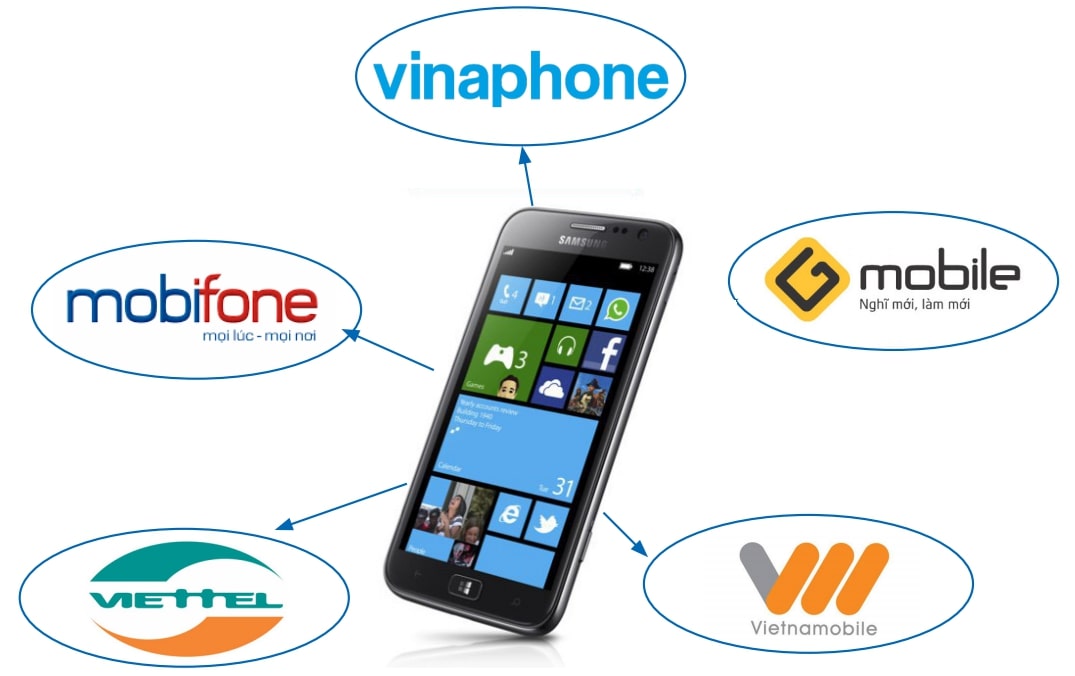
Get ready to be amazed… Vietnam has some of the cheapest phone and internet plans you will find in the world. Opt for one of the top providers such as Vinaphone, Viettel or Mobifone and you’ll find monthly plans including 3-5 GB of highspeed mobile data and unlimited calls and texts for as little as $10-15 per month. Note that for a postpaid monthly plan you will need a local bank account.
If you haven’t had time to set one up yet, grab a prepaid card until you do. For about $5 you can get 3-5 GB of highspeed mobile data packages which are valid for a month. Unused data expires after 30 days so maybe try a smaller package to avoid wasting money on data you don’t need. Chances are you can get by with a light data plan since even the smallest cafes and restaurants offer Wi-Fi.
Calls and texts will cost you extra but at only a few cents apiece/a minute, you can easily get by with less than $5 a month – especially since many people in Vietnam use Line, WhatsApp or Facebook Messenger to call and text.
Highspeed internet at home is similarly cheap. The main provider, FTP offers a package complete with unlimited data and access to 60 local and international TV channels for only about $6 a month.
Medical bills and insurance
Apart from visas, this is probably one of the least fun things to take care of before coming to Vietnam. If your employer handles insurance for you, you’re in luck! Keep in mind though that many insurance policies in Vietnam require you to pay for treatments yourself and then claim the costs – a good reason to always have a little cash available in case of an emergency.
If you are in charge of your own insurance, you have two options. Number one: get international health insurance which covers Vietnam before you leave home. This will come in handy if you travel a lot because you will be covered in many countries. Depending on the level of coverage you choose, this could cost you anywhere from $50 to several hundred dollars a year.
You can also get an insurance plan once you are in Vietnam. There are several companies specializing in insurance for expats, so you will have plenty of options. You can choose your level of coverage and which types of facilities and treatments you want to include in your plan. Again, this will influence how much you pay annually or monthly.

Since Vietnam is known to be cheap, you might be tempted to opt out of health insurance, especially if you have no pre-existing conditions you need regular treatment or check-ups for. If a one-off doctor’s visit becomes necessary a few times a year, this approach will probably be more cost effective. But, if you have an accident or any other kind of serious health condition arises which requires expensive treatment, bills can quickly add up. Yes, surgeries and other medical procedures are cheaper in Vietnam than in most western countries, but that does not mean that paying everything out of your own pocket isn’t going to bust your budget or create serious financial implications. Please consider this carefully!
Pre-trip vaccinations
When planning a stay in Vietnam, there are no vaccinations you are legally required to get. However, standard vaccines including Hepatitis A and B, Tetanus and Diphtheria are generally advised. If you intend to spend a lot of time in rural areas, a Rabies shot is also a good idea. Depending on where you live and which kind of health insurance coverage you have, you might be able to get these vaccines for free or not. Check with your local clinic to learn about the costs and plan them into your budget.
Getting around in Ho Chi Minh City
You have a few options to get around Ho Chi Minh City. The cheapest is to walk around your local neighborhood. But let’s face it, you will need to get to other parts of the city too. For this, you can get the standard taxis (like Vinasun or Mailinh) which are about $7 for a 15-minute trip, or use Grab, the local version of Uber which usually costs only $3-4 for the same 15-minute drive (surge prices may apply during peak hours though). Apart from cars, Grab also offers taxi bikes which usually cost only a third of the price of cars.
Getting your own motorbike
If you want to be completely independent, you might want to consider getting your own bike. Both buying and renting are valid options, depending on how long you are going to be around and how big of an investment you are willing to make. 
Buying a motorbike in Vietnam
To give you an example, the popular Honda Air Blade, a fully automatic 150CC bike, costs about $2000 new but can easily be found much cheaper on Facebook’s expat groups. Search for people leaving the country and selling their bikes and you will be able to get great deals, sometimes as low as a few hundred dollars. Put in a little time and chances are you’ll find a bike within only a few days! If you buy a used one though, be sure to check it thoroughly. You wouldn’t want to get a bargain only to be running to the repair shop or getting stranded with a dead bike in traffic a day later.
Of course, fancier or bigger bikes are available too. If you know your stuff, you’ll have a good time visiting various vendors and seeing their offering to scout for your perfect bike. Just remember to haggle for a good price and walk away if you feel like you are being charged too much.
While the initial investment of buying a bike is high, remember that if you take good care of it, you will be able to resell it when you leave Vietnam. If you bought the bike from an official dealership (used or new) you can even take it back there and save yourself the hassle of posting it on Facebook and looking for a buyer.
When getting your own bike, also think of registration fees and insurance. Getting your registration is around $50 when you register the bike with a local license plate and insurance is another $50. While we hope you will never have to use it, the crazy traffic in Vietnam makes having insurance a very good idea.
Renting a motorbike in Vietnam
If getting a new bike is too big of an investment for you or you don’t want to go to the trouble of buying one, you can rent one. There are plenty of rental shops all around the city and you can pick from a variety of models.
They will have everything from automatic to manual, from 150CC to motorcycles. The automatic ones are usually the cheapest and will cost you about $60 to rent per month. This will include maintenance and insurance in most cases, but always reconfirm this before signing anything. Semi-automatic bikes are for the more skilled drivers and are usually a bit cheaper, starting at about $40. Manual models are the most expensive to rent and will start at about $120 per month.
Low-Budget Living in Ho Chi Minh City
Approximate lowest cost of living: 600-700 USD/month 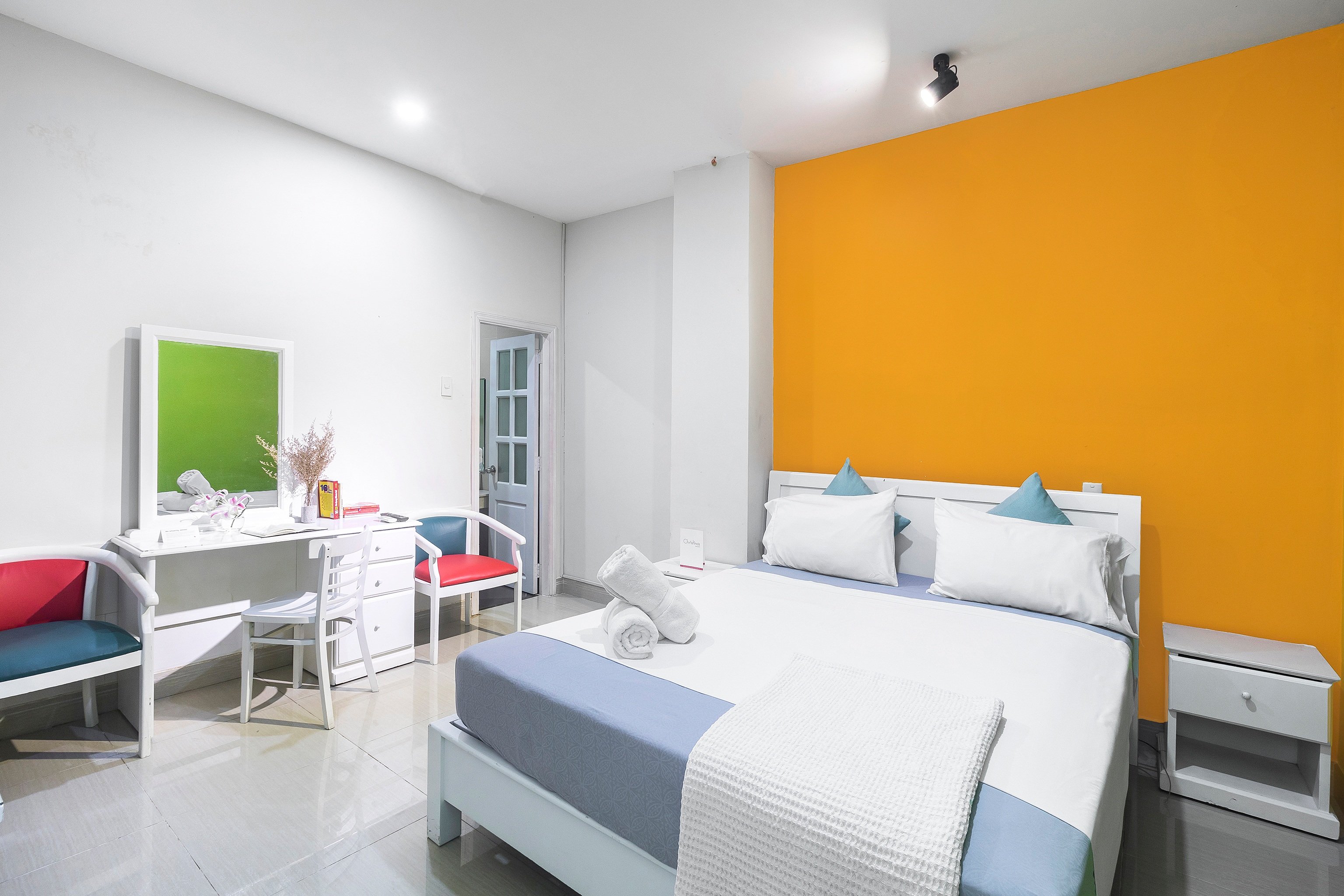
Renting on a budget in Ho Chi Minh City
As in any other city, which area you choose to live in will drive up or lower your monthly rent check. That being said, you can find budget-friendly options in most of Ho Chi Minh City’s districts if you know where to look. If you want to keep your expenses as low as possible, the best solution for accommodation is a shared apartment or house. You can find people looking for new roommates in the various expat Facebook groups or on expat websites.
If you choose an area like District 1 and 3 (the commercial and historic center of the city) you’re probably looking at rent from 350 USD for a room in a shared flat or traditional Vietnamese house. District 2 (where many expats live, and many international schools are located) will be similar. In District 4 chances are good that you could find something slightly cheaper as it is a bit further from the center. Binh Thanh and Phu Nhuan are two more budget-friendly districts which are a bit further from the center though. There you can find rents for shared rooms as low as 200 USD. Of course, it also depends on the type of accommodation you’ll be sharing. If you’re going for a flat in a luxury condo, 450-500 USD is a good deal. If you’re looking at an unserviced apartment or house between 200 and 300 USD is what you should be looking for.
Another thing to consider when choosing your budget-friendly residence is how far it is from your work. Traffic can get pretty crazy here and turn a quick 20-minute drive into a stressful 45 minutes if you’re unlucky. Especially in Binh Thanh and Phu Nhuan this holds true. On top of the time it takes to travel, you’ll want to consider transport costs. If you have your own bike, it’s alright because gas is quite cheap (about 5 USD to fill a tank on a standard motorbike) but if you rely on taxis, bills will pile up quickly.
Neighborhood amenities
The areas with the cheapest rent will generally be home to more locals than expats. Apart from allowing you to get a first-hand experience of the day-to-day life Saigonese people lead, these districts will also be kind to your budget. Instead of big-name supermarkets, you will find mom and pop stores selling fruits and vegetables, small, open-air coffee shops with the iconic plastic stools instead of fancy air-conditioned chains and clothing, appliance and furniture stores selling cheap, no-name goods. 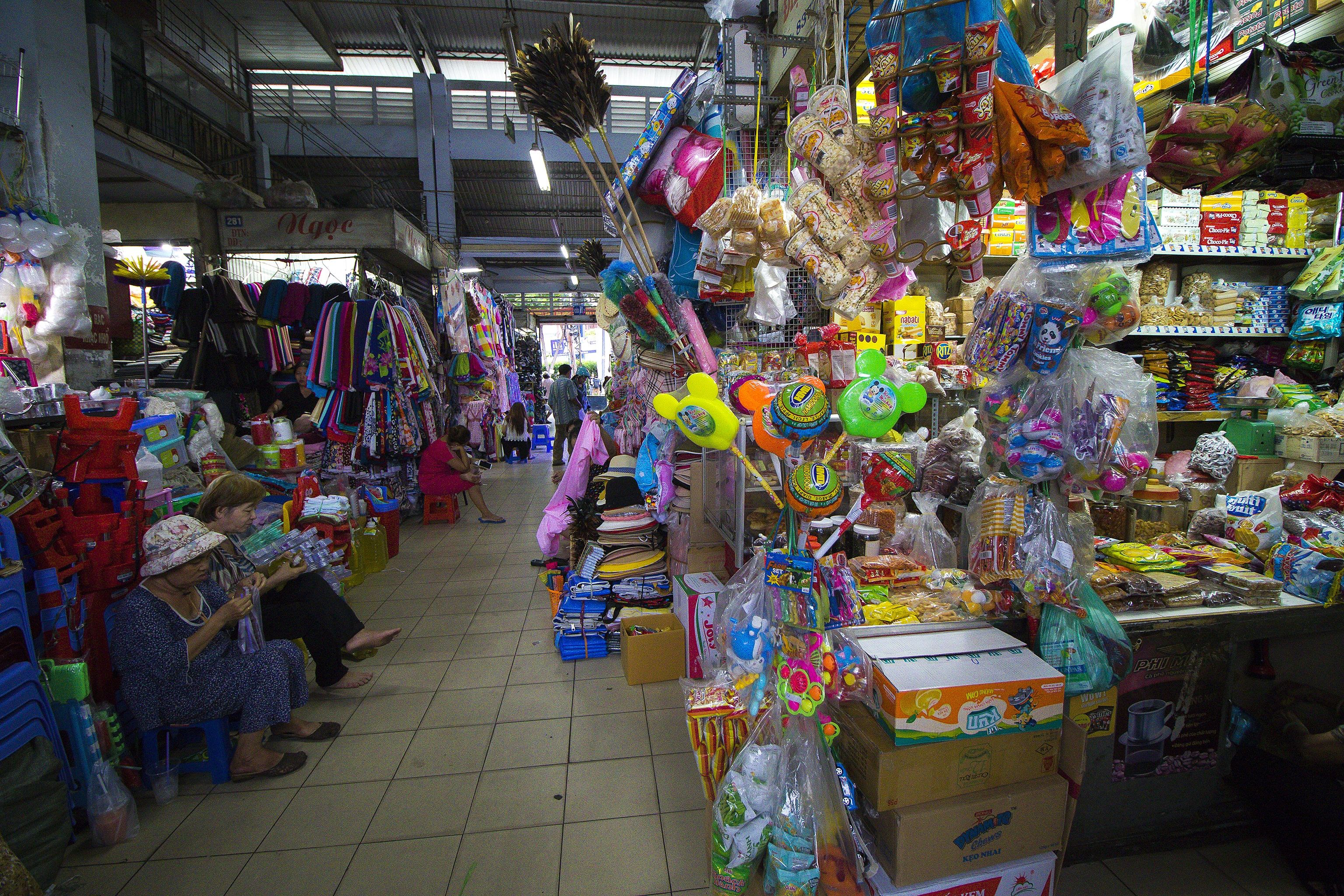
Living in this kind of neighborhood will help you keep your daily expenses low as you will get good deals on everything you need. Some necessary items for your apartment like a fan, iron, or rice cooker can be found here for cheaper than in most city-center appliance stores and if it breaks, you can always take it back to get it fixed, usually for just a few dollars. Some of the best deals for these appliances live on Facebook though. Again, people leaving Vietnam sell things for cheap or give them away, so always check the expat groups!
How much you spend here largely depends on how much shopping you like to do. But if you get to Saigon with everything you need, and rarely feel the urge to buy stuff, 10 USD or less on average per month should be enough.
Food
Eating out for cheap in Ho Chi Minh City
No matter where in Ho Chi Minh City you live, cheap food is never far away. The street food culture is alive and well here and the many vendors offer delicious treats for incredibly low prices. A bowl of Vietnam’s dish, pho, can cost as little as 2 USD and will fill you up nicely. Other soups cost around the same. If you want something with more substance, find yourself a com tam shop. This is usually a family-run restaurant which sells rice with a side of veggies and barbecued meat. Most com tams only have a handful of dishes to choose from but since there are usually several of them in one street, you’ll always be spoilt for choice. Dishes there will cost about 2-3 USD. 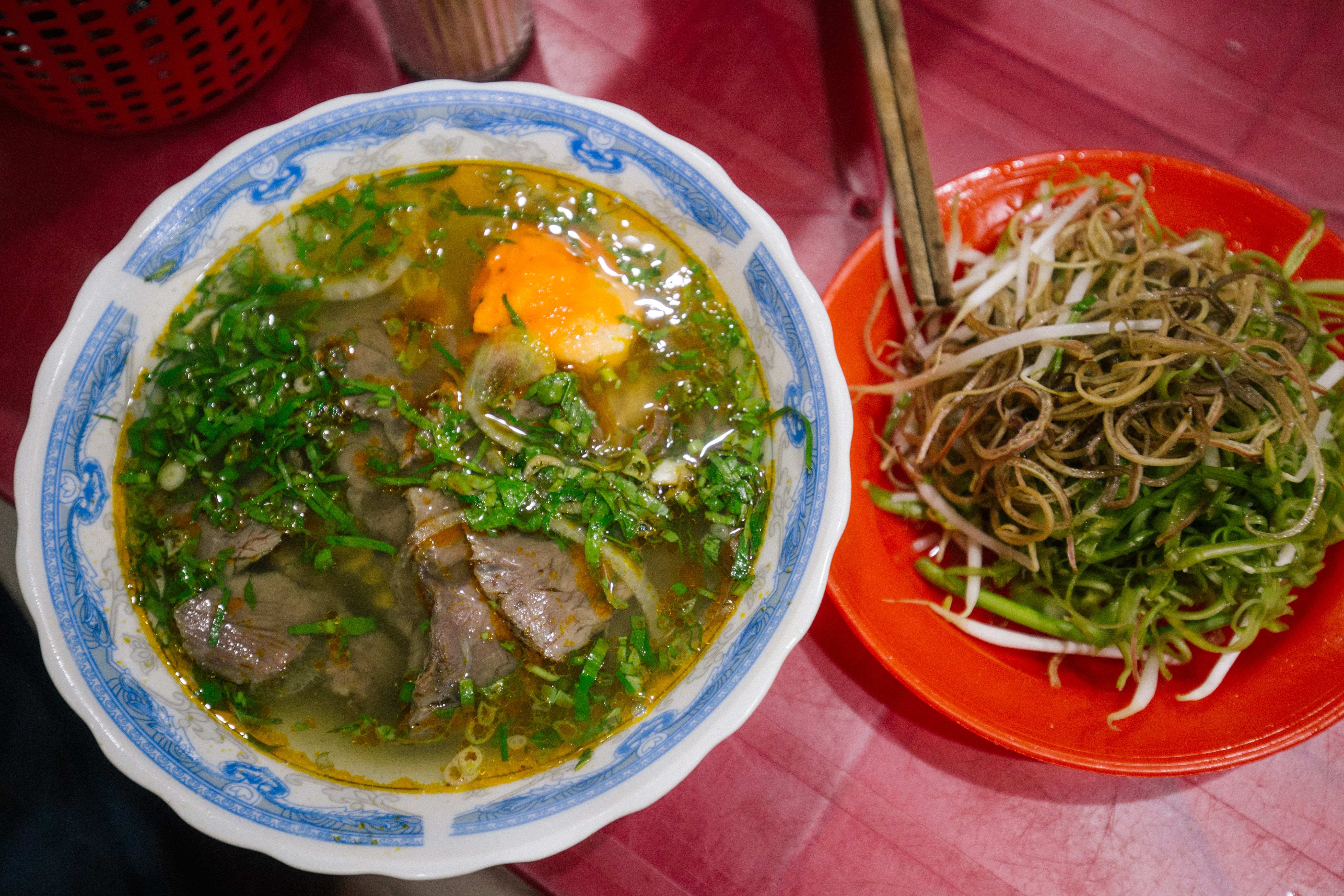
Grocery shopping on a budget in Ho Chi Minh City
Prefer to cook at home? Then avoid supermarkets and buy your ingredients from the mom and pop stores on your street. Each shop usually has its specialty, so you might need to go to several before you get everything you need. Generally, one shop will sell rice and noodles, another will have various kinds of fruit and another will have fresh vegetables. To cook a full dinner, expect to pay around 1-2 USD for groceries, depending on what you get. Meat is probably the only thing you should buy at supermarkets. There you can be sure it was stored hygienically unlike in the small shops where it often sits out in the open the whole day.
Budget-friendly entertainment
The amazing thing about Vietnam is that you can have a fabulous time on any budget. Even if you are tight on cash, there will always be a bar where you can grab a beer for about 2 USD. Check around your neighborhood and you will find plenty of spots to spend a night out. In areas like Binh Thanh and Phu Nhuan, you’ll find the local favorites, beer gardens, and karaoke bars. They are fun to try but not for everybody…
If you are looking to have a cheap time on a budget but want something more western, head to Bui Ven, the famous backpacker street. Here you’ll find open-air beer bars, pubs, and other watering holes which won’t burn a hole into your wallet.
If you are looking for something cheap to do which does not involve drinking, why not explore Saigon’s many museums. They are full of interesting stories about Vietnam and bring history to life with photos and historical artifacts. The best thing about them: they are delightfully cheap with entrance fees never above 1-2 USD. Cinemas are also reasonably priced here with the average movie ticket costing about 5 USD.
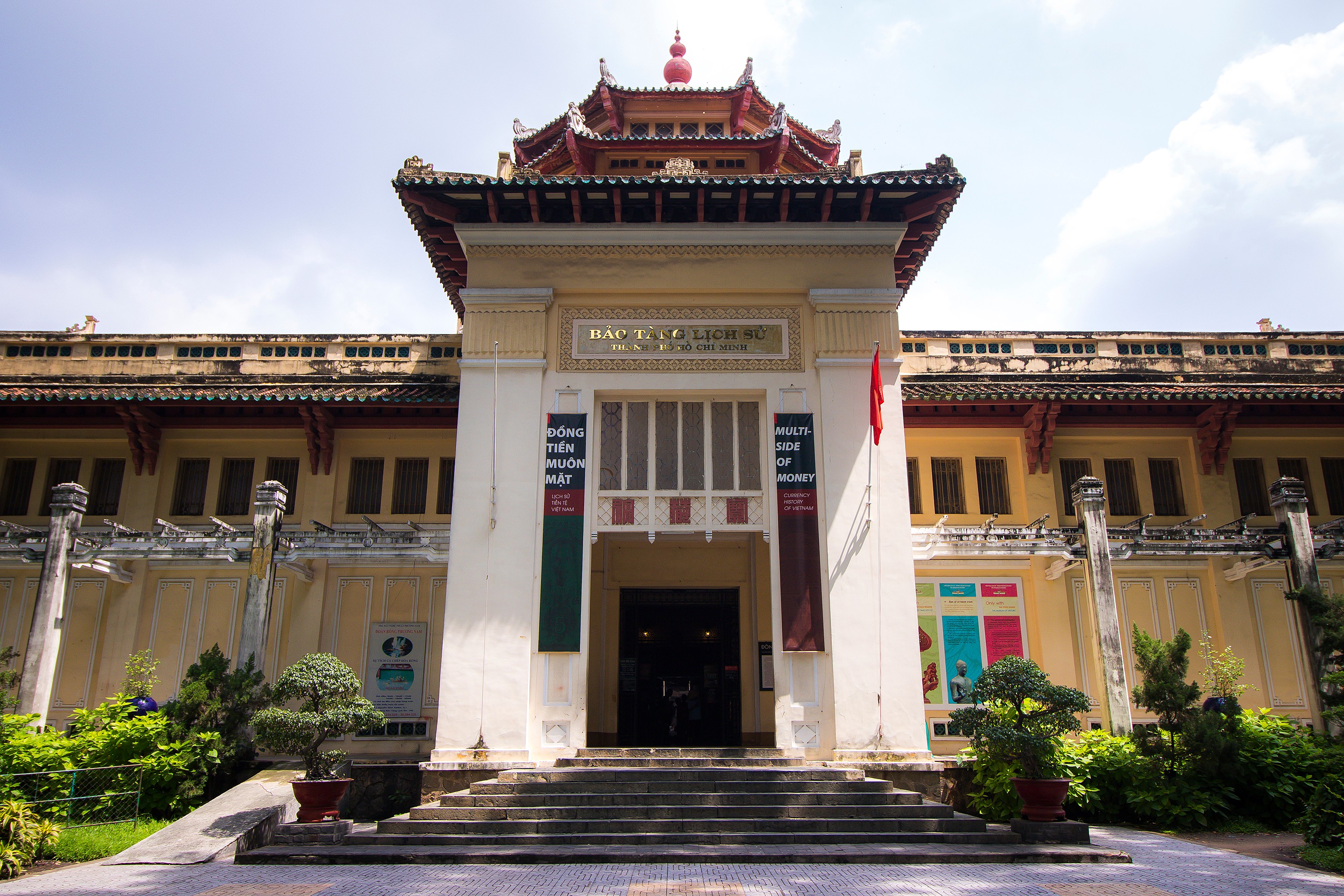
If you want to make friends while trying new activities, why not join free events or Meetups. They come in all shapes and sizes, ranging from yoga and meditation groups to running meetups, creative get-togethers or cooking classes. All you need to do is some research, then take your pick!
Mid-Range Budget Living in Ho Chi Minh City
Approximate comfortable living cost: 1,000 – 1,200 USD/month (excluding travel)
Renting on a mid-range budget in Ho Chi Minh City
If you want to stay in your own apartment rather than a shared flat or house, you will likely find the best deals in smaller serviced apartment buildings. There are plenty of them all around Districts 1, 2, 3,4 and 7, so you can choose freely. If you go for a studio or a one-room apartment with simple amenities and limited services (i.e. simple furniture, weekly cleaning, no pool or gym), you can probably find deals starting at 350-400 USD. If you want a place with common areas like a gym or pool, you’ll find them for around 400-500 USD.
To discover reasonably priced apartments with the amenities you want and located close to your work, have a look around Facebook’s expat groups. There you will find plenty of real estate agents who are more than happy to help you find your apartment. Since the landlord pays the commission instead of the tenant, why not take advantage of the service and have a local help you out?
Another good way to find accommodation in an area you like is to simply check what kind of serviced apartment buildings show up on Google and pay them a visit. The staff there will be able to show you vacant rooms and you might even be able to negotiate a bit if you can offer to sign for an extended period (around 6-12 months).
Neighborhood amenities
Residential areas in District 1, 2, 3, 4, and 7 come with all the amenities and infrastructure you could possibly need. You will find a mixture of mom and pop stores and supermarkets as well as modern shopping malls with all the international brands to choose from. Know though that imported goods will often cost more than if you buy them in your home country.
Since you will be surrounded by both simple shops with cheaper local products and large chains, you have the choice of where to shop without having to go very far. That’s great for your budget because you can compare the offerings in different shops and decide which one to go for.
How much money you need for shopping will largely depend on what all you need to buy for your apartment and which shops you choose to buy from. The same goes when shopping for clothes and other necessities. Overall though, around 20-30 USD a month should be enough here.
Food
Eating out on a mid-range budget in Ho Chi Minh City
Saigon is home to many wonderful restaurants which are surprisingly budget-friendly. If you don’t want to go for street food every day, you can still find delicious meals in sit-down venues for about 5 USD per person. If you choose a slightly fancier place, you’ll pay 10 USD per person and walk out stuffed. These prices apply to places serving Vietnamese fare as well as international dishes.
The best place to find these restaurants would be around District 1, 3, and 4. Since that’s where many offices are located, you’ll probably have plenty of lunch options to choose from and would be able to find a good deal on dinner too. What often drives up meal tickets is the drinks, so opt for the free (or very cheap) tra da, Vietnamese iced tea, and get your soft drinks or juices from the convenience store or the street vendors. 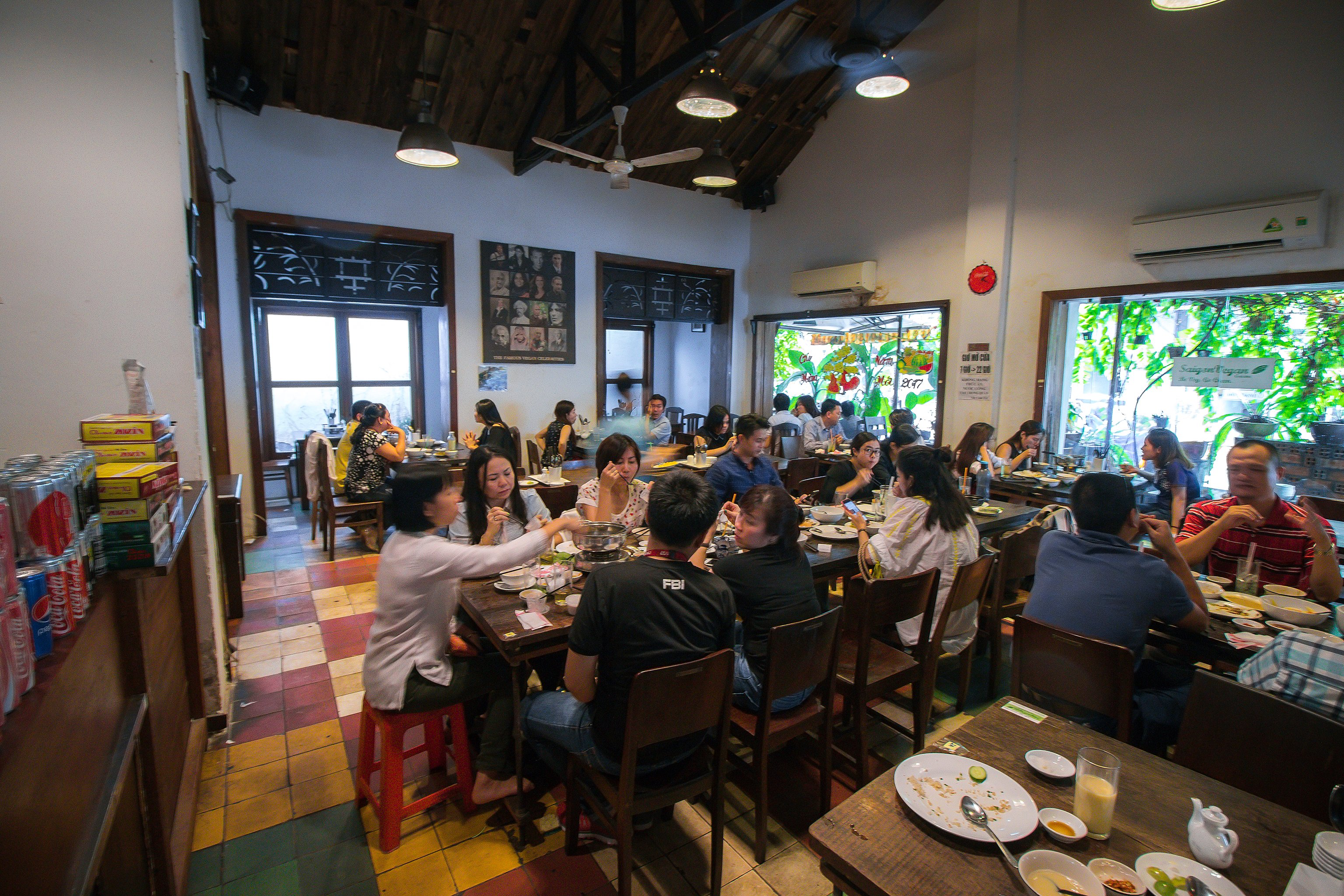
Grocery shopping on a mid-range budget in Ho Chi Minh City
Grocery shopping in Vietnam is considerably cheaper than in most western countries so you will probably be surprised by how little of your monthly budget goes into it. If you get your fruits and vegetables from the mom and pop stores next to your apartment, you’ll pay around 1-2 USD to cook a full dinner for one person. Getting the same at a supermarket like BigC will cost more like 3-4 USD, depending on whether you choose imported or local produce. Buying things like rice, pasta, and other non-perishable items in larger packages will be more cost-effective, even when you are shopping at big-name stores.
Budget-friendly entertainment
Going for a night out in Ho Chi Minh City is the best example of having a great time on a budget. Many bars serve beer for 2-3 USD and cocktails for 5-6 USD. These places can be found around D1 and D3. A good place to start your evening is on Bui Vien, the backpacker road. Apart from cheap beer bars on the sidewalk, you can find plenty of nicer bars and rooftop venues there. Drinks are priced fairly, and you’ll likely make friends who can tell you about plenty more great bars and lounges to spend a night out without breaking the bank.
Of course, there are plenty of activities in Saigon which do not involve drinking. You can spend a night in a board games café, create your own food tour, or explore new galleries popping up around Saigon. All of these activities cost little and still make for a good night out. Movie tickets are even less than 5 USD.
Traveling on a budget in Vietnam
If you’ve still got some money to spare after your monthly expenses are covered, why not explore Vietnam? Travel in Vietnam is quite cheap if you take local buses, minivans, trains, or even budget airlines. Depending on where you are going and how long in advance you book (mainly for airlines), you’ll be paying around 10-20 USD for a comfortable seat on a sleeper bus and rates start at 40-50 USD for a flight to anywhere in Vietnam. Accommodation can also be inexpensive with quaint homestays and cozy hostels starting as low as 10 USD a night. That means that with a little bit of planning, you can spend a wonderful weekend in the nearby Mekong Delta or Dalat for only around 150 USD per person.
Luxury Living in Saigon
Approximate luxury living cost: 1,700 – 2,000 USD/month or more (excluding travel)
Renting high-end accommodation in Ho Chi Minh City
With beautiful new apartment complexes springing up everywhere in Saigon, you are spoiled for choice when looking for a high-end condominium. All of them come with one or more pools, a gym, common areas, and sometimes even basketball and badminton courts. The popular VinHomes development even has its own huge park which is perfect for morning runs or walks. 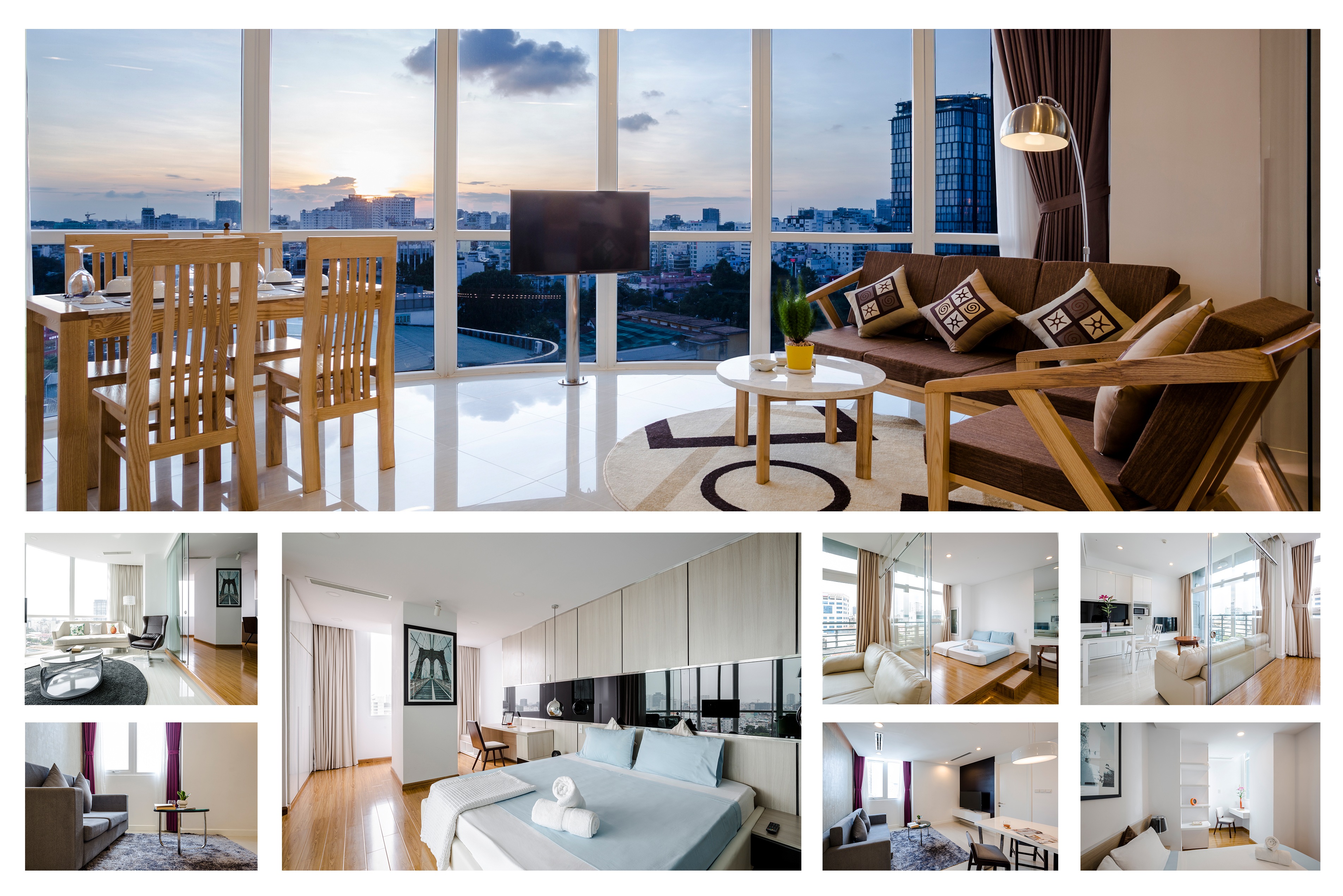
The most well-known and high-end developments are in District 1, 2, and 7. Several other nice ones are in District 3 and 4. The main difference here is that when living in D2 and 7 you will be surrounded by a lot of expats and have more international restaurants and shops close by. If you choose D3 or 4, you will get great apartments set in a more local area. This will keep rent down so you end up getting better value.
If you want to find a luxury condo in Ho Chi Minh City, the best way is to work with a real estate agent. Since rent is not cheap and you probably want to stay for a while, you need a trustworthy setup. Getting an agent to put you in touch with the landlord, help draw up the contract and support you with registering your address with local authorities will make things go smoothly. You can get the contact details for agents on Facebook since they often advertise their offering there or via local real estate websites.
When renting a one-bedroom apartment in one of these fancy condos, expect anywhere from 600-800 USD for rent. The window here is so big because the rent largely depends on which district your condo is in (as outlined above). And since the real estate market in Ho Chi Minh City is changing rapidly and new condos are being built all over town, prices will probably fluctuate in the future. That being said, it’s always worth it to negotiate your rent a bit! While you do that, ask your landlord if this includes the management fee. If not, be ready to add an extra 25-30 USD to your rent budget for a one-bedroom flat.
Another extra could be a daily or weekly cleaning service. Many of the large condos do not offer this by default. You can ask your building for assistance when getting household help though. Alternatively, you can contact a local agency to get things sorted. This is the most reliable option and would cost about 30 USD per month for one day a week and around 140 USD per month for five days a week.
Neighborhood amenities
If you have chosen D2 or 7 as your new home, you are looking at a very comfortable life. You will find yourself surrounded by elegant supermarkets, malls, and appliance stores offering you everything you would find back home and more. While you could still find some mom and pop stores (especially in D2), you are more likely to have an organic shop with international import products next door.
International schools, good hospitals, and clinics as well as fancy restaurants and nice cafes can also be found in these areas. High-end gyms are easy to find in Saigon’s top neighborhoods as well and usually cost about 30 USD for a basic membership. Things get pricier if you want to work with a personal trainer (starting at around 20 USD an hour) or if you get add-ons like yoga, spin, or martial arts classes.
If you live in an area like downtown D1, D2, or D7, you’ll spend more money on life’s pleasures. Many things here will also be slightly more expensive than in other areas of the city. Of course, your monthly shopping expenses depend on your lifestyle and consumption habits, but if you live in D2 or 7, a reasonable estimate would be around 50-100 USD per month or more.
Food
Eating out in Ho Chi Minh City

When you don’t have to consider your budget while eating out in Ho Chi Minh City, you will have more options to choose from than you can handle. Check out some of Saigon’s beautiful upscale Vietnamese restaurants where the food is not only delicious but also gorgeously presented and served in a refined setting. Many international restaurants like steakhouses, elegant Italian restaurants, and specialty venues like Korean barbecue places should also be on your list.
But here comes the best thing! Even the fanciest restaurants in Ho Chi Minh City will usually not cost more than 30 USD for a lovely multi-course meal and a drink or two. Of course, there are exceptions, for example, if you head to restaurants in five-star hotels, but overall, even fine dining is surprisingly affordable in Vietnam. If you’re on a generous budget, get ready to eat out in a lot of fancy places while you are here!
Grocery shopping at Ho Chi Minh City’s organic gourmet markets
If you’ve chosen to live in an upscale neighborhood like D2 or D7, or you’ve gone for one of the top condos downtown in D1, you probably value high-quality groceries and don’t mind spending a bit of extra money to get exactly what you want. Then you are in luck because these three neighborhoods have several excellently appointed shops and supermarkets where you can get all the international, organic import products you could ever imagine.
Whether you are looking for brands from France, the UK, Germany, Korea or Japan, you will find it all there! If those are the kinds of stores you frequent, be ready to pay about 7-8 USD for the ingredients which go into a one-person dinner. 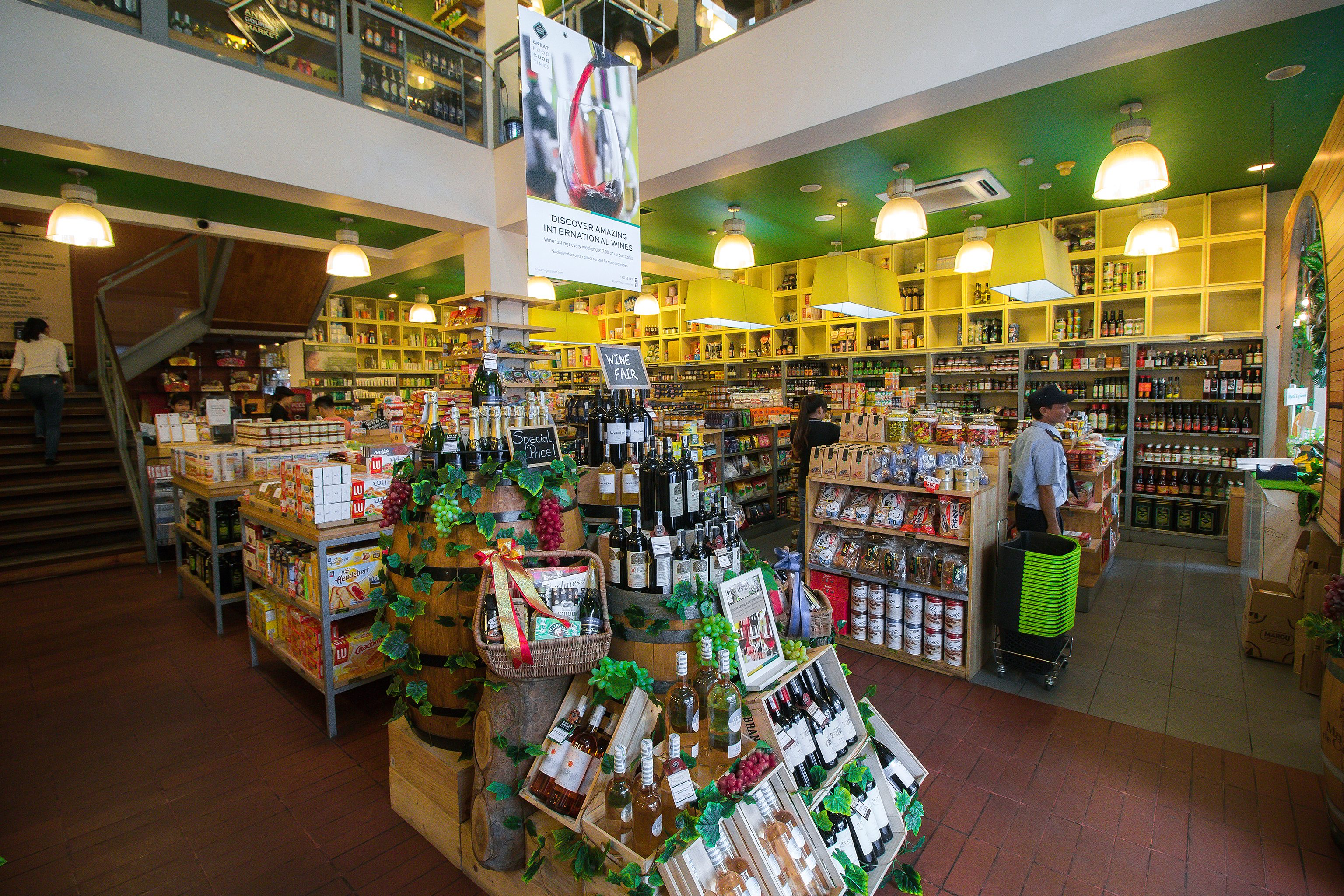
Upscale entertainment in Ho Chi Minh City
For those who can afford it, Saigon offers great nightlife options. Whether you want to sip drinks at fancy sky bars, go to concerts, enjoy craft beers and boutique bars or dance the night away at a club, there’s a bit of everything here. At these fancier venues, expect to pay around 5-6 USD for a beer, 10-15 USD for a cocktail and sometimes a 10-20 USD cover charge, depending on which night you’re going out and where.
But Saigon has much more to offer than just nightlife. If you are looking for other kinds of entertainment, you are in luck. Sign up for a day trip to a nearby lake for paddle boarding, join a pottery class, go on an organized bike tour in the countryside or take a workshop of computer coding or pen lettering.
The best places to find all these cool activities? You’ve probably guessed it by now… Facebook! Check co-working spaces for professional workshops, bike shops for outings, or the expat groups for other kinds of cool stuff to do. Depending on what you are interested and who is organizing things, you’re looking at a range of prices starting from 20 USD for half-day workshops and going up to 100 USD for all-inclusive, full-day excursions.
Luxury travel in Vietnam
While in Vietnam, travel is a must. And if your budget allows it, you can treat yourself to some wonderful trips and experiences. Whether you want to stay at a luxury spa for a weekend or go for a trek in the untouched mountains or Sapa far away from the tourist trails, there are countless options available.
Flights around the country start at about 40 USD if you book a while in advance. Private drivers can be found for 50 USD a day so you can easily organize your own day or weekend trips. Once you get to your destination, you’ll generally have a wide choice of accommodation. Budget-friendly homestays start at about 10 USD per night and offer you the chance to get to meet your host and learn more about the community they live in.
If you prefer hotels, a simple one will start at around 30 USD a night, and upscale hotels will charge 40-50 USD per night. In Hanoi and Saigon itself, as well as the main resort destinations, you will also find many international luxury hotels. Depending on the level of service they offer, you can get a standard room there from 65-100 USD. Luxurious beach resorts will start at 80 USD but can run up to several hundred dollars if it’s an all-suite property for example.
Now that you have a basic overview of what it costs to live in Ho Chi Minh City, doesn’t it sound like the perfect city for any budget? Whether you are working the odd job to get by and want to enjoy a carefree couple of months here or prefer to make Saigon your new home for the foreseeable future while working a well-paying job, you can have the time of your life here! Got any more questions about what’s what when moving to Vietnam? Then give us a shout or check out our extensive content library on the 4U Trip. Check out other articles on our blog about long-term living as well.
A Guide to Living in Hanoi as a Local
